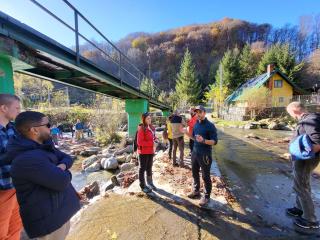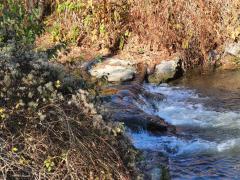Water experts convene in Romania

WASHINGTON, D.C.—The USDA Forest Service International Programs office recently collaborated with the American engineering firm Inter-Fluve to support a two-day “Reconnecting Rivers” technical workshop in Romania. The workshop convened specialists from Europe and the United States to exchange knowledge on how the removal of obsolete barriers can benefit freshwater ecosystems, reduce risks to humans and save municipalities money. Participants included government representatives from the Romanian Ministry of Environment and civilian representatives from nongovernmental organizations Waters Romania, World Fish Migration Foundation, and Fauna & Flora. The U.S. Army provided funding for the workshop.
“We visited a sewage pipe laid directly in a streambed. Romanian experts and American engineers talked through the options for reducing the risk of drinking water contamination downstream,” said Kelsey Aho, watershed program manager for Europe & Eurasia in International Programs.
The Forest Service manages lands that provide drinking water for more than 180 million Americans. American citizens can use Forests to Faucets to consider potential upstream risks to water contamination. Water experts in the workshop shared their experiences in creating tools such as Forests to Faucets and removing barriers to fresh water. They also talked about the importance of connecting water users with land managers.
“There isn’t a better result than knowing Romanian administration is interested in continuing the conversation,” said Pao Fernández Garrido of World Fish Migration Foundation.
The Forest Service is one of 17 U.S. government agencies that contributes to the U.S. Global Water Strategy. According to the strategy, “USDA contributes to domestic and international efforts to increase access to clean water and improve conservation, management, and restoration of watersheds and water resources.”
International Programs has worked in the Europe & Eurasia region for decades to share expertise, learn from peers abroad and collaborate on watershed challenges of global consequence. Much of this work has been supported by other U.S. government agencies, including the Department of Defense.

